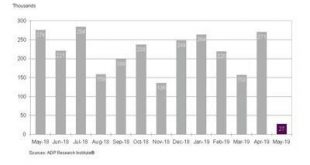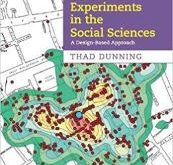from Malgorzata Dereniowska Environmental ethics is a field of applied ethics concerned with the ethical dimension of human relationship towards nature. The term environmental ethics covers a variety of approaches that can be roughly divided into two camps: anthropocentrism and non-anthropocentrism. Anthropocentrism refers to a human-centered approach to environmental problems that protects nature for humans. Radical anthropocentrism is often equated with the view that only human beings...
Read More »The slowdown cometh
by New Deal democrat The slowdown cometh I submitted a long post on the above to Seeking Alpha. They haven’t put it up yet. When they do, I’ll link to it here. UPDATE: Here’s the link. Long story short: you all know that a year ago I forecast a slowdown by about mid-year this year. Everything except for portions of GDP and jobs has acted in accordance with that forecast. And, judging by this morning’s ADP jobs report for May: the official jobs report...
Read More »Open thread June 7, 2019
Tariffs are a bad response to an imaginary border crisis
from Mark Weisbrot Donald Trump won the presidency–despite losing the popular vote by 2.8 million—with a campaign that careened wildly from one distraction to another. He has clung to this as a Twitter and governing strategy ever since. As there are 190 countries in the world, and the United States trades with most of them, trade wars so far have provided a shovel-ready supply of such diversions. So, here we are: Last Thursday, just in time to distract from the more potentially violent...
Read More »Maximum wellbeing within ecological limits
from Max Koch Herman Daly’s “steady-state economy” (Daly, 1974) is the most cited case of an economic system that functions within ecological boundaries. It is a model of an economy that does not grow in the sense that it keeps the level of throughput (extraction of raw materials from nature and their return to nature as waste) as low as possible and ideally within the regenerative and assimilative capacities of the ecosystem. However, the original concept of a steady-state economy was...
Read More »Open thread Jume 4, 2019
The ecosocialist path to 1.5°C sustainability
from Richard Smith We ecosocialists have a practical answer. We accept the science that to prevent runaway global warming “greenhouse emission must be reduced by 45 percent from 2010 levels by 2030, and by 100 percent by 2050.” We agree with the IPCC that this will require “deep emissions reductions in all sectors.” We agree that it will require “far-reaching transitions in energy, land, infrastructure, and manufacturing,” that it will require “systems transitions” (indeed, more than they...
Read More »Randomization and experimental design in the social sciences
from Lars Syll Thad Dunning’s book Natural Experiments in the Social Sciences is a very useful guide for social scientists interested in research methodology in general and natural experiments in specific. Dunning argues that since random or as-if random assignment in natural experiments obviates the need for controlling potential confounders, this kind of “simple and transparent” design-based research method is preferable to more traditional multivariate regression analysis where the...
Read More »The wonderful world of free market drugs
from Dean Baker I write about the possibility of producing drugs without patent monopolies frequently for several reasons. First, drugs can be essential for people’s health or even life. It should not be a struggle for people to pay for them. Second, there is a huge amount of money at stake, way more than in almost any other realm of public policy. Third, it is such a great example where government intervention, in the form of patents and related monopolies, creates the problem. This is...
Read More » Heterodox
Heterodox


